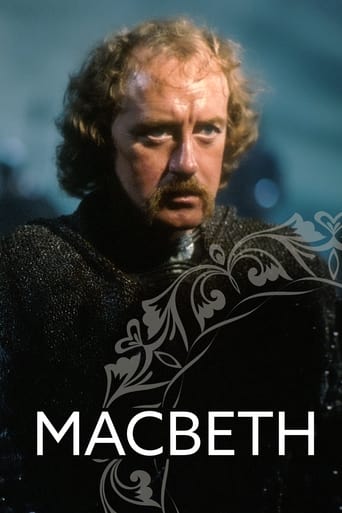

I actually prefer Nicol Williamson's Macbeth to Sir Ian McKellen. He is far more believable in the role. I believe Williamson to be one of the better Shakespearean actors. Even Jane Lapotaire's Lady Macbeth is better than Dame Judi Dench's performance. Perhaps Dench and McKellen just lacked the physical chemistry Williamson and Lapotaire appear more likable to me. I believe them more as a couple. While I enjoy all the actors mentioned above, this version is more than just a stage version. There is no audience. The costumes and art direction could be better overall. Still the BBC kept true to William Shakespeare's words. This version could do well in high school classrooms since this play is part of the curriculum. I prefer this version overall to the recorded Stratford version. If I had to choose between this version and Roman Polanski's film for the classroom viewing experience, I would take this version because it is more faithful overall.
... View MoreThis was my first viewing of Macbeth. I didn't really rate it. Williamson's delivery is always a bit Leonard Rossiter, which adds some welcome and not inappropriate humour to his Hamlet, but really doesn't work for this character. Sometimes his hysterical throes with Lady Macbeth put me in mind of Rigsby and Miss Jones.The two leads don't have much chemistry or sexual chemistry. Shakespeare cuts to the chase in this play; no sooner have the witches voiced his destiny, he's licking his lips and plotting, no sooner has Lady Macbeth been informed of this via letter, she's turning murderous! It may be that the surviving play is abridged, some say. But for this to be convincing we have to see something unpleasant or visceral in the two leads just waiting to be untapped by fate, and I didn't see it here. Like, Cherie Blair would be a good Lady Macbeth, and the ambitious Gordon Brown her husband (okay, that's an unlikely alliance!) Here, you don't get the sense that their personal chemistry is the catalyst for murder and downfall. You just think, 'Are they crazy? What are they playing at?'
... View MoreAlthough this is a rather dark film, Macbeth was written as a dark play and therefore is very fitting.The way that this film was done reflects the difficulties of converting a successful and ageless stage production into a filmic production. It is filmed and acted in a way that expresses the actors' stage presence and ability while exercising the many capacities that cameras have.It is worth watching. I have had to view many different versions of Macbeth for many classes in the general ed and collegiate levels and this version does justice to the original text and to the stage origins of the play.
... View MoreNicol Williamson obviously belongs to the "Macbeth is Nuts" school of the Bard because he's virtually a drooling lunatic by the time he spits out "Tomorrow, and tomorrow...".A shame that no one sought fit to sign up a rational human for the role, especially because the BBC series is so popular--this was the first word-by-word Shakespeare performance I saw...thank God I've seen others since.
... View More